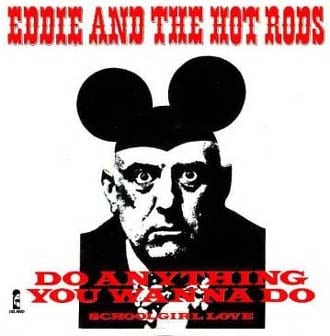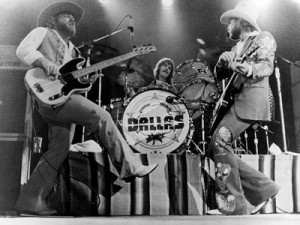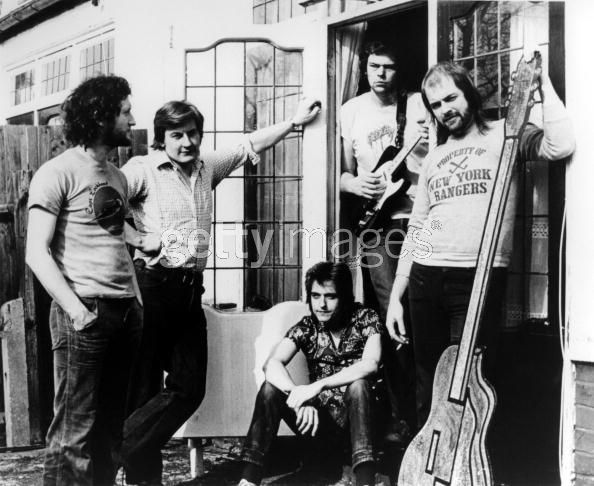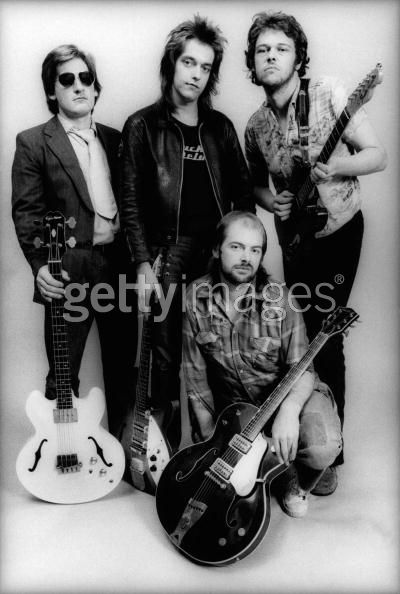It’s not often we get a message through The Back Office from someone who may not even be registered as a Rock Town Hall participant suggesting a thread idea, but recently we received such a suggestion from such a lurker! I won’t give this person’s name, but I encourage him to register and claim credit for this cool story. Dig:
Press for the reunited Graham Parker & The Rumour tour (and album) focuses much attention and credit on the band’s appearance in Judd Apatow‘s upcoming movie, This Is 40. I’m sure that played a small part, but longtime members of the Halls of Rock know this 2010 interview with Rumour guitarist Martin Belmont is the main reason the band is back together and playing at Philadelphia’s Theater of the Living Arts tonight. OK, our interview is a distant second to the documentary Belmont discusses in the following interview, but let’s give ourselves credit ahead of Apatow. Next thing you know the Farrelly brothers will be taking credit for exposing Jonathan Richman to a mainstream audience. Go Graham! Go Martin! Go Rumour! I will be at tonight’s show with bells on.
This post initially appeared 3/19/10.
The guitar playing of Martin Belmont has graced recordings and concerts by Graham Parker & The Rumour, Ducks Deluxe, Nick Lowe, Carlene Carter, Johnny Cash, Elvis Costello, and many more. He continues to keep a busy schedule, playing the music he loves with a reunited Ducks as well as three other Americana-oriented British artists. In 2009 Belmont released The Guest List, a collection of covers sung by most of the singers he’s backed for a significant time over the years. For someone like myself, who grew up listening to Belmont’s work in the 1970s and 1980s, it’s an intimate, low-key way of catching up with the old gang and getting introduced to some Belmont collaborators who are not as well known in the States.
The first sign that Belmont might get into the spirit of a Rock Town Hall interview is when, as we settle into our trans-Atlantic, webcam chat via Skype, he wants to describe his “top-shelf” CD collection lining the walls behind him. There’s a Beatles box set, a Folkways Anthology of American Folk Music, a couple of Elvis Presley box sets. Then he wants to know how we operate in the Halls of Rock. After I basically run him through our mission statement, in which Rock Town Hall serves as a sort of methadone clinic for rock ‘n roll addicts with increasingly busy lives, he says, “I know exactly what you mean.”
I describe my experiences finding out about Graham Parker & The Rumour as a teenager, trying not to come off too much like Chris Farley’s mouth-breathing Paul McCartney fan from Saturday Night Live. Belmont asks if I’ve seen Parker perform solo in recent years – I have. He raves about his old friend’s abilities as a performer and songwriter, and then we get down to talking.
And talk we did. There are a topics we didn’t have time to cover, but as we chatted, rock lover to rock lover, I hope you get a sense of Belmont’s ultimate sideman’s dedication, warmth, and regard toward his collaborators. At one point he talks about the importance of the guitarist serving the song and being able to weave into whatever situation the song and its musicians requires. It was clear to me that these abilities to weave extend well beyond Belmont’s fretboard.
The patented Rock Town Hall Dugout Chatter segment that concludes this interview is presented in audio form. Through my space-age, retro technology for recording this interview, I hope the audio Chatter gives you an added sense of Martin’s enthusiasm and passion for rock ‘n roll. Take it away, Martin!


Photo by Dan Burn-Forti
Nick Lowe’s 45-year career as a singer-songwriter, record producer, and all-around musical instigator is a one-man Village Green Preservation Society, to quote the Kinks’ 1968 mission statement. After brief spell in a Cream-influenced psychedelic rock band, Kippington Lodge, Lowe and his fellow UK mates, including future standouts in the late-’70s new wave scene, got an early start on “preserving the old ways” in the Americana roots-rock band, Brinsley Schwarz. A big push to launch the band in the States flamed spectacularly, and in the US their records would be left for music nerds to dig out of the far reaches of used record bins for the next decade.
In 1976, following the demise of the Brinsleys, he hooked up with veteran Welsh musician and producer Dave Edmunds and carved out a role for himself “protecting the new ways,” as house producer for fledgling punk/new wave label Stiff Records. His “So It Goes” b/w “Heart of the City” was the first single on Stiff, and it heralded the artist’s devil-may-care approach to writing subversive takes on AM Top 40 hits of the ‘60s and early ‘70s. His solo output at this time peaked with his second album, Labour of Lust, on which he was backed by Edmunds and fellow members of Rockpile. The single from that album, “Cruel to Be Kind,” with the shaggy video including scenes from his wedding to Carlene Carter, is the most vibrant expression of the new wave era’s cheerful sense of fatalism. He must have been a good fit for the June Carter-Johnny Cash clan.
As a producer, Lowe made his mark helping Elvis Costello & The Attractions craft a diverse, high-octane run of 5 straight albums in 5 years, including their unexpectedly sincere take on one of Lowe’s Brinsley Schwarz-era hippie goofs, “(What’s So Funny ‘Bout) Peace, Love, and Understanding.” Known as “The Basher,” for his no-nonsense approach to both work and play, Lowe wasn’t messing around, although frequently it just seemed that way.
By the mid-’80s, despite a few minor hits and continued successful production work, Lowe was losing his way. His records lost their snap. The jokes were growing stale. The snappiest of that run, 1990’s aptly named Party of One, was nevertheless the end of the line for Nick the Knife.
I suppose with my advancing age I’m not quite so interested in tricks in the studio, sort of wham-bam-thank-you-m’am.
A few years later, financially secure thanks to a Curtis Stigers cover of “(What’s So Funny ‘Bout) Peace, Love, and Understanding” being included on the soundtrack to Whitney Houston’s schlock smash, The Bodyguard, a mature Nick emerged. He was done chasing pop stardom, done with dick jokes. He embraced his pop classicism on albums like Dig My Mood, The Convincer, and At My Age. His latest album, The Old Magic, goes even further in this vein, skirting the raunch of rock ‘n roll, soul, and country music for something more akin to early ‘60s dinner club pop balladeering. The new album has been a tougher sell for me than his last few gems, but Lowe’s craftsmanship and comfort in his own skin are impressive. Over the phone, Lowe was as warm, open, and engaging as his music might suggest. He made a couple of mentions of the thrill of meeting and playing with one of his own heroes, the recently deceased Levon Helm, and his new musical friends, Wilco. A thrill’s a thrill, whether it’s the thrill of looking backward or the thrill of looking ahead.
RTH: I was looking at your tour schedule and was saddened to see that this coming Saturday you were supposed to play a Midnight Ramble show with Levon Helm. I know you’d appeared with him on Elvis Costello’s Spectacle, which I didn’t get to see. Had you met Levon before, say in the Brinsley Schwarz days?
NICK LOWE: Yes, I sure did. The Brinsleys had a house just outside of London., where we all used to live together. One day some people phoned up and said the Band, who were doing a big show at Wembley, in 1972 or ‘73, needed a place to rehearse. These people said, “Can they come out to your house and rehearse?”
They hadn’t played for a while. We just couldn’t believe it, we were such big fans. Anyway, they all turned up, they played on our equipment, you know, ran once through what they were going to do on the show, and off they went again. I might have said, “Hello.” It was a huge thrill.
RTH: When you played with Levon on Spectacle was that the only time you’d performed with him? Continue reading »
In our continuing review of Rock Town Hall’s first 5 years as a blog, we will be providing some brief reviews of key aspects of this place. The hope is these overviews will pay homage to the contributions of our peers and provide newcomers easy access into the blog’s rich past. Let’s look at Rock Town Hall’s role as a semi-historical rock resource.
Hey man, you can take your country rock and leave the best parts of The Flying Burrito Brothers to me! I love the band’s first album, The Gilded Palace of Sin, for its heavy bass, fuzz guitars, and reedy vocals. No offense, but I could give a damn about the whole “country” thing. My favorite country music usually sounds like rock ‘n roll anyhow.
As much as I love the band’s debut, it’s all a little hokey and dated, the way many “psychedelic” albums are bound to be. Better yet is the band’s 1970 follow-up album—and the last one with St. Graham Parsons—Burrito Deluxe. It’s actually way more country rock, with future Eagles member Bernie Leadon joining the band on lead guitar and vocals. As much as I hate Eagles (not The Eagles, as we recently learned), Burrito Deluxe explains why anybody else may have cared to make such music. (Thank god some of the pub rockers, like Brinsley Schwarz, actually had the spirit and playfulness to nail this approach!) Maybe some fans like the more traditionally country songs, but for me the album centers around a few pinky-rock classics: “Lazy Days,” a breakneck cover of Dylan’s “If You Gotta Go, Go Now,” and the song with this super-hokey video that I just found, “Older Days.” (The album also featurs a nice version of “Wild Horses,” but I’m afraid to tell you that for fear that your mind will run to a series of glorified Stones cliches.)
There are few musical styles that more readily hit my soul than chooglin’ pinky rock. When done by The Flying Burrito Brothers on Burrito Deluxe I get the perfect mix of the best parts of the intersection of The Grateful Dead’s occasional pinky-rock workouts and The Velvet Underground‘s Loaded. And that Bernie Leadon was something else! I remember seeing an old Eagles performance of one of the few songs by them that doesn’t make me throw up, and Leadon was on fire. How’d that guy get lost in the rock ‘n roll shuffle?
I’ve long sought videos of the band from this period with no luck. Tonight, after a pretty trying day that, unfortunately, looks to be headed for an equally trying tomorrow, I hit paydirt! Here’s an actual live clip of “Lazy Days,” from the time shortly after Parsons left the band.
Townspeople, I just came across this abbreviated, super-charged version of The Move‘s “Hello Susie,” by a band I’d long heard of but never heard, Amen Corner, led by a musician I’d long heard of and knew of as a sort of Oliver, I believe, for big British bands in the ’70s but never heard play on his own, Andy Fairweather Low.
Hearing this version of “Hello Susie” for the first time was pretty exciting, primarily for the fact that Bev Bevan is not paradiddling all over the tune. As loyal as I am to The Move (and as tolerant as I am of their excesses), Bevan’s sloppy, sludgey style sometimes aggravates me. Amen Corner’s arrangement gets to the chugging, cascading heart of the song and doesn’t overdo it. Ultimately it makes for a “lighter” approach in scope as well as the song’s inherent ability to celebrate The Power and Glory of Rock, but tonight I was intrigued and wanted to hear more. Continue reading »
In honor of the recent RTH interview with Martin Belmont I want to have a look at his first band, Ducks Deluxe, and the later careers of its members to see what it tells us about the evolution of British rock in the ’70s and afterwards.
As Martin says in the interview the Ducks specialized in rough and ready rock and worked best when focused on frontman Sean Tyla. Mr. Mod already posted the one good clip of the band playing one of its signature songs live, but here’s the studio version of “Coast to Coast.”
It was the opening track of their eponymously titled first album, and I love the way Tyla welcomes the audience with “All right, kids, are you readuh?” We’re going to talk more about him later, but Tyla was a real character, and he specialized in this kind of straight ahead, almost Springsteenian rock. Here’s “Fireball.”
Tyla also liked to write about imaginary Americana, so there are songs with titles like like “Rio Grande” and “West Texas Trucking Board.” The problem with Ducks Deluxe as a recording band is that you can’t really have a whole album of uptempo rockers like that, and they faltered a bit when it came to ballads. Also, there were two other songwriters in the band, our buddy Martin Belmont and Nick Garvey, and the vocals on those songs are much less distinctive than Tyla’s. Here’s Belmont’s “Something Goin’ On,” with later Ducks bassist Micky Groome on vocals:
The different styles of the songwriters just seem to make it a little hard to get a fix on the identity of the band. Live this probably would not have been so much of a problem, and the excellent covers on their albums (Eddie Cochran’s “Nervous Breakdown,” Bobby Fuller’s “I Fought the Law,” and Bobby Womack’s “It’s All Over Now”) give some other hints of why they were popular on the pub rock circuit. But as usual in this genre their records didn’t sell, and they disbanded in 1975.
They had a decently selected best-of LP named after another of their signature rockers, “Don’t Mind Rockin’ Tonight.”
It was issued in 1978, I assume because the members had achieved some fame in subsequent bands. I don’t think it ever made it out of the vinyl era, but you can probably find a copy. Despite their lack of sales at the time, they are now pretty well-represented on CD. Their two regular albums (the second one is called Taxi to the Terminal Zone) are available as a twofer. And there’s a second twofer with their third record, which was an EP, some stray tracks, and then the first album by the Tyla Gang, Sean’s next band, again about which more in a minute. The Ducks have actually reformed recently for some European dates, and they’ve issued a very nice, newly-recorded EP called Box of Shorts, which, except for being much better recorded, sounds pretty much like the original band. Here’s a clip of them performing a song from the EP, “Diesel Heart,” in Stockholm last year:





